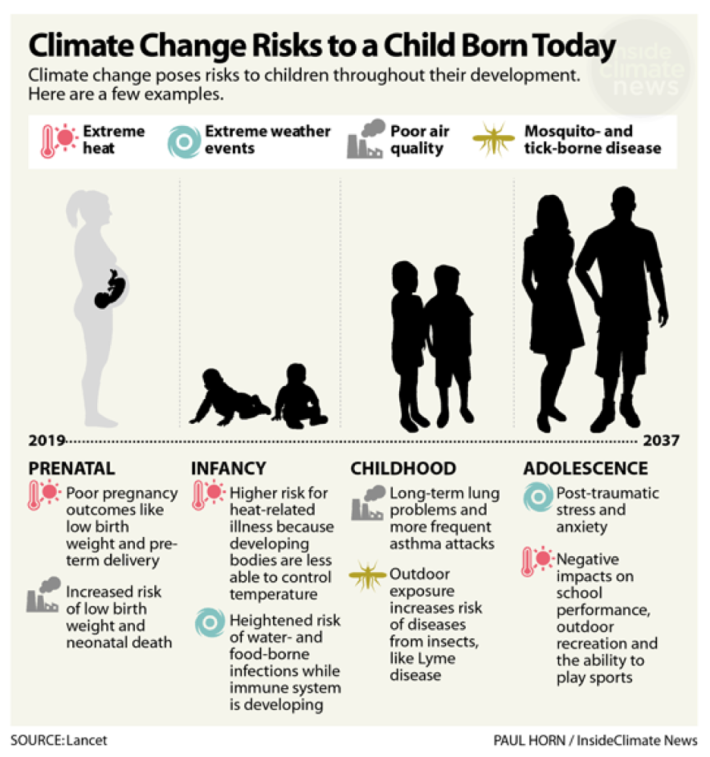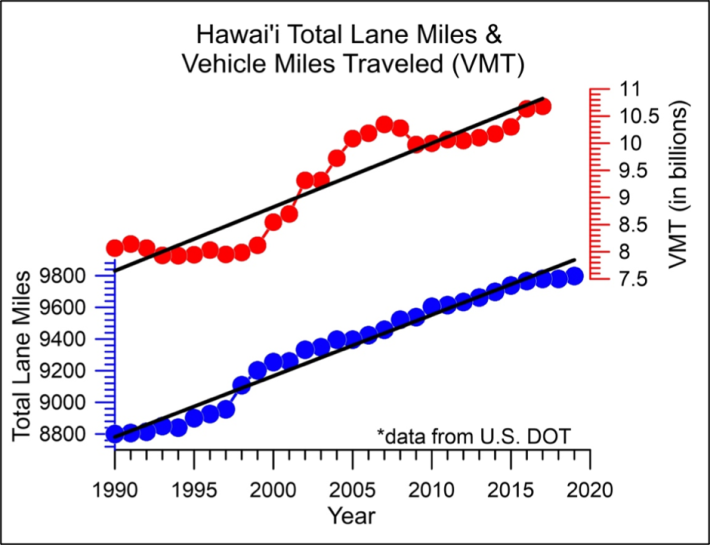Children and teenagers are suing their state's transportation leaders for the outsized role they've played in the ongoing climate crisis — and if they succeed, their efforts could empower new generations across America to do the same.
Earlier this month, a coalition of young Hawaiian climate leaders ranging in age from 9 to 18 years old sued the Hawai'i Department of Transportation and its director, plus Gov. David Ige, for the harm caused by the "active operation of a transportation system that results in high levels of greenhouse gas emissions, [which] is causing significant harm to their communities, violates their constitutional rights, and undermines their ability to 'live healthful lives in Hawai'i now and into the future.'"
Despite the legislature's legally binding commitment to achieve a fully decarbonized economy by 2045, transportation sector emissions in the Aloha State have trended steadily upward in recent years. By 2017, a staggering 51 percent of the state's total greenhouse gases were attributable to roads and ports; by 2030, analysts project the sector will be responsible for 60 percent, essentially putting broader climate goals out of reach.
"For years, young people in Hawai'i have been asking for help," said Andrea Rodgers, senior litigation attorney at Our Children’s Trust and co-counsel for the youth plaintiffs. "Hawai'i, in many ways, has been a leader in terms of recognizing the climate emergency, but transportation has been the primary reason why the state hasn’t been making the progress it needs to be making."

That dire future, though, isn't the only reason the plaintiffs believe they deserve legislative relief — because climate change is devastating their communities right now.
Across a sprawling 70-page suit, the children and teens described the harrowing traumas they've endured as a direct result of climate change, including the loss of their homes in catastrophic floods, the extended closure of critical roadways that have impeded their basic mobility, and the destruction of the beaches and ocean ecosystems that are deeply important to Hawaiian life.
For Native Hawaiian youth, in particular, climate change is also actively eroding critical cultural practices and, often, the livelihoods upon which their families rely. Extreme weather events are ravaging the lo‘i kalo (taro farmland) and loko i'a (pond fisheries) that their people have tended for generations; some have even seen their ancestor's bones (‘iwi) disinterred by rising sea levels, and culturally significant marine life, like green sea turtles and monk seals, threatened with extinction.
Taken together, the present-day harms of climate change are already triggering "elevated levels of anxiety, depression, post-traumatic stress disorder, increased incidences of suicide, substance abuse, social disruptions like increased violence, and a distressing sense of loss" among Hawaiian children and teens, the suit contends.
And over the long haul, children born in 2020 can expect to experience between two and seven times more extreme climate events than people born in 1960 — a gap that's widening as government leaders like the Hawai‘i DOT fail to take meaningful action.
"The challenges young people are experiencing from climate change, it’s not just impacting their environmental rights; it’s impacting their lives," added Rodgers. "Their lives are being shortened because of climate impact ... [And meanwhile], they’re not politically represented; they can't become lobbyists, and most of them aren't old enough to vote."

Rodgers emphasizes that for the state of Hawai'i to fulfill its legal obligation to its children and teens, policymakers and DOT leaders may not actually need to chart a radically different approach. They'll just need to fund and implement the carbon-cutting strategies that they've already outlined, instead of ignoring them and building endless lane miles for drivers instead.
As part of the 1978 Hawai'i State Planning Act, DOT leaders are theoretically required to give "priority and preference" to mass transportation on highways, as well as to maintain continuous networks of separated bike lanes and sidewalks throughout the state's communities. The bill also encourages the state to "endeavor" to cut vehicle miles traveled, "decrease the percentage of single occupancy vehicles in the State’s mode share," and "assess and maximize total throughput of people across all modes of transportation," in addition to providing electric vehicle charging infrastructure for the cars that remain on the road.
But the plaintiffs say leaders haven't done any of those things. Instead, they've added 980 miles of lanes to the state's road network between 1990 and 2017 alone — and because of the well-known law of induced demand, that's increased vehicle miles traveled by 32.8 billion, and added 13 million metric tons of CO2 to Hawai‘i’s cumulative greenhouse gas emissions total.
"[HDOT leaders] are not planning for a complete transformation and decarbonization of the transportation system," added Rodgers. "Doing that would require substantial changes in how people are getting around the islands. That would require significant investments in other forms of mobility — and they aren't happening."
"This lawsuit is the latest development in Hawai'i’s multigenerational, often Native-led movement to protect the Indigenous land rights and natural resources from pollution and environmental degradation." #MondayMotivation #ClimateCrisis https://t.co/YQL5nQpNEd
— Surili Sutaria Patel (she/her) (@SuriliSutaria) June 6, 2022
Rodgers says that if her clients win their suit, it won't be up to either them or the courts to determine what, exactly, HDOT will need to do to get the climate strategy back on track.
Compared to the other communities, though, it will probably have an easier time charting a path forward. Aside from being one of the handful of government that's even set a concrete, legally enforceable timeline for statewide decarbonization, Hawai'i is also one of the only states that's written meaningful statewide pedestrian and bicycle master plans; they've just been more or less sitting on the shelf since 2013 and 2003, respectively.
If the youth of Hawai'i can persuade a judge that transportation leaders are denying them their constitutional rights to a healthy present and future — and force them to set the kind of enforceable carbon-reduction benchmarks that can command real change — Rodgers is optimistic that other youth in other states can do the same. Our Children's Trust has similar suits pending in Florida, Montana, Utah, and Virginia, and continues to pursue similar litigation nationwide.
The New York State constitution was recently amended to guarantee “each person [the] right to clean air and water, and a healthful environment.”
"A lot of people are really frustrated with the lack of progress on decarbonizing, particularly in the transportation sector," Rodgers adds. "This suit is saying: Now is the time to right the ship."






